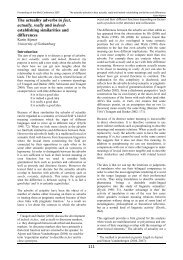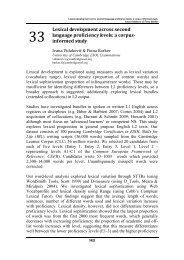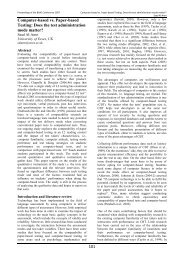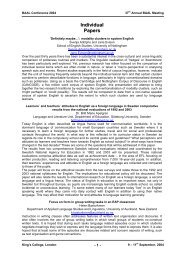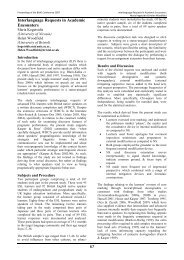Proceedings of the - British Association for Applied Linguistics
Proceedings of the - British Association for Applied Linguistics
Proceedings of the - British Association for Applied Linguistics
You also want an ePaper? Increase the reach of your titles
YUMPU automatically turns print PDFs into web optimized ePapers that Google loves.
But I have no idea with my dissertation topic’: Participation, Language and Identity in <strong>the</strong> experience <strong>of</strong> L2 students<br />
Hania Salter-Dvorak<br />
As Stake argues, “people can find in case reports certain insights into <strong>the</strong><br />
human condition, even while being well aware <strong>of</strong> <strong>the</strong> atypicality <strong>of</strong> <strong>the</strong><br />
case” (2005:456). These two accounts provide a number <strong>of</strong> insights. First,<br />
<strong>the</strong>y reveal how, in <strong>the</strong> invisible practice <strong>of</strong> academic writing, <strong>the</strong> artefact<br />
<strong>of</strong> <strong>the</strong> CoP is dependent on <strong>the</strong> interactions which support its creation,<br />
many <strong>of</strong> which are fleeting. Second, <strong>the</strong> findings spotlight <strong>the</strong> use <strong>of</strong><br />
different learning spaces and suggest that awareness <strong>of</strong> this could help us to<br />
understand more about <strong>the</strong> role <strong>of</strong> interaction in learning. Third, <strong>the</strong>y<br />
demonstrate how <strong>the</strong> power <strong>of</strong> faculty is wielded in ways which appear<br />
subtle but have strong consequences. Often it is what <strong>the</strong>y don’t do that is<br />
harmful. Power and responsibility <strong>of</strong> faculty, <strong>the</strong>n, begin with course<br />
design, which sets <strong>the</strong> scenario <strong>for</strong> <strong>the</strong> learning in <strong>the</strong> course CoP. A<br />
scenario which introduces literacy events <strong>for</strong> exchange <strong>of</strong> views and<br />
guidance creates relations and identities which can carry on subsequently;<br />
if <strong>the</strong> assumption is that guidance, sought by <strong>the</strong> student, will automatically<br />
be provided, <strong>the</strong> onus is placed entirely on <strong>the</strong> student.<br />
This research reveals academic socialisation as a dynamic, two way process<br />
in an unstable unpredictable context. Here, successful LPP entails not only<br />
producing artefacts, but also, more importantly, <strong>the</strong> ability to negotiate <strong>the</strong>ir<br />
production; while students do not automatically become active participants<br />
in an academic community, <strong>the</strong>se identities can be positively nurtured<br />
through course design. It is through <strong>the</strong>ir absence that hegemonic attitudes<br />
can be imposed on L2 students in Anglophone Academia.<br />
References<br />
Pierre Bourdieu (1991). Language and Symbolic Power. Polity Press: Cambridge, UK.<br />
Anne Edwards (2002). Responsible Research: Ways <strong>of</strong> Being a Researcher. <strong>British</strong><br />
Educational Research Journal, 28, 2, 157-168.<br />
Erving G<strong>of</strong>fman (1959). The Presentation <strong>of</strong> Self in Everyday Life. Anchor Books<br />
(University <strong>of</strong> Edinburgh Social Sciences Research Centre): Edinburgh, UK..<br />
Tamsin Haggis (2009). What have we been thinking <strong>of</strong>? A critical review <strong>of</strong> 40 years<br />
<strong>of</strong> student learning. <strong>British</strong> Educational Research Journal, 29, 89-104.<br />
Roz Ivanic (1998). Writing and Identity: The discoursal construction <strong>of</strong> identity in<br />
academic writing. John Benjamins: Amsterdam, Ne<strong>the</strong>rlands.<br />
Jean Lave & Etienne Wenger (1991). Situated learning: Legitimate peripheral<br />
participation. CUP: Cambridge, UK.<br />
Mary Lea, & Brian Street (1998). Student Writing in Higher Education: an academic<br />
literacies approach. Studies in Higher Education, 23,157-172.<br />
61



